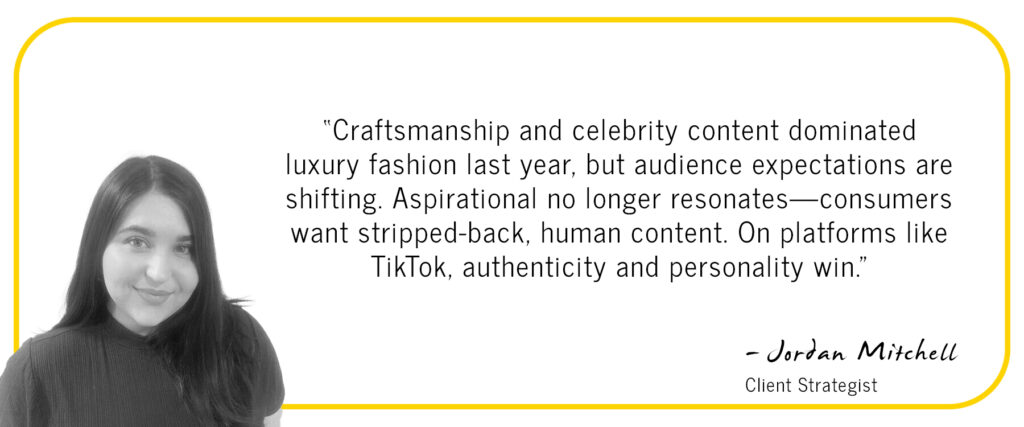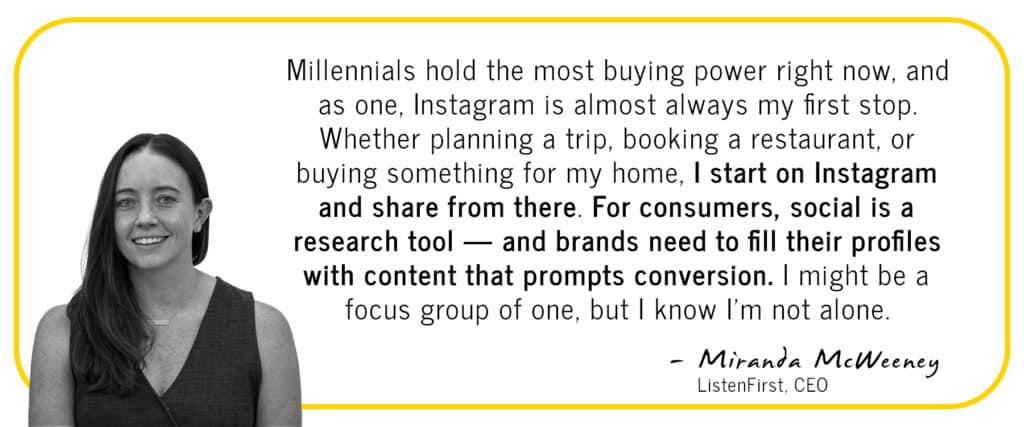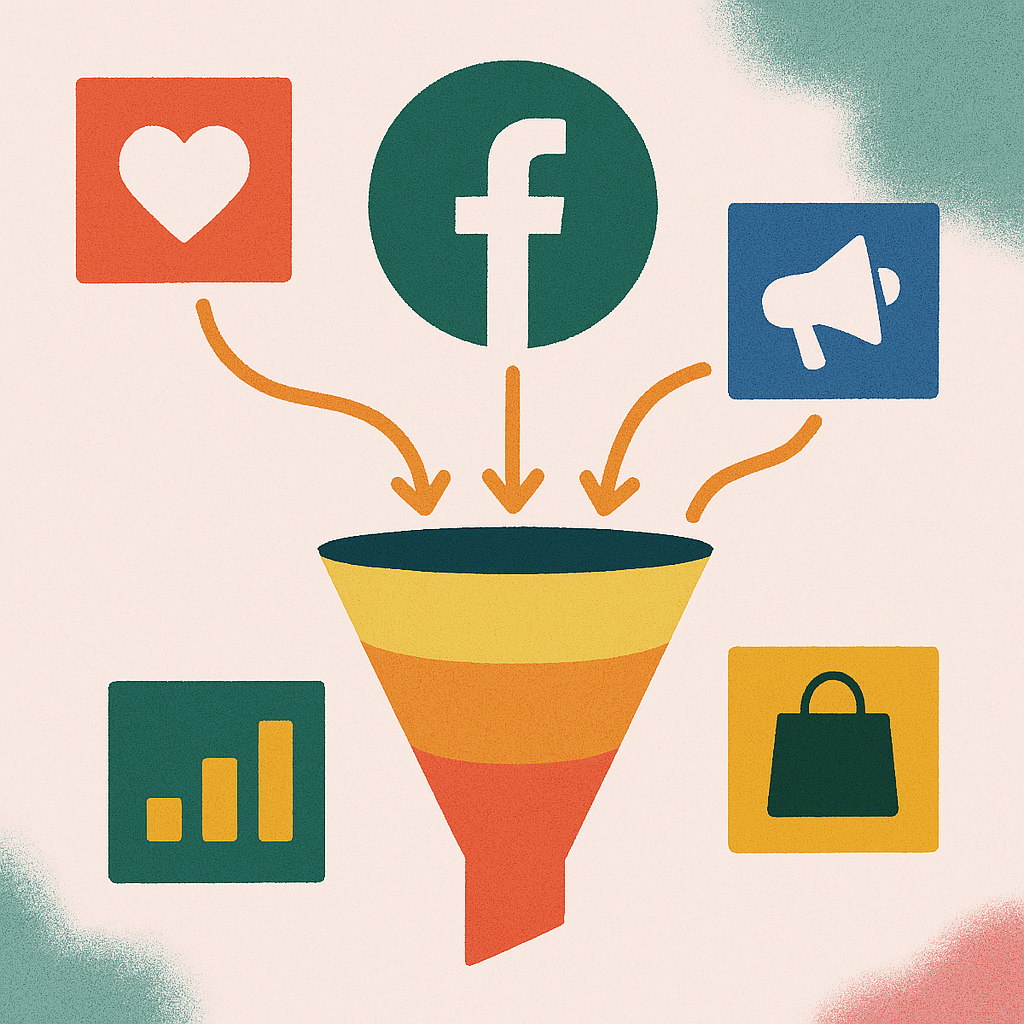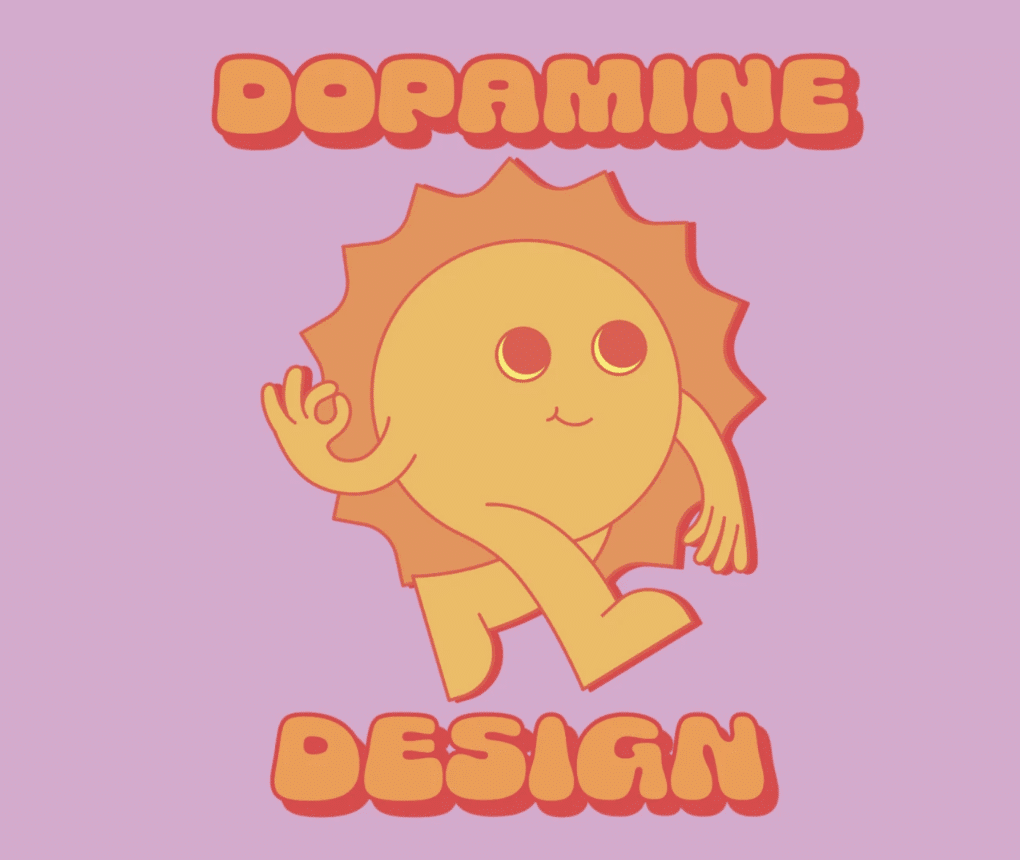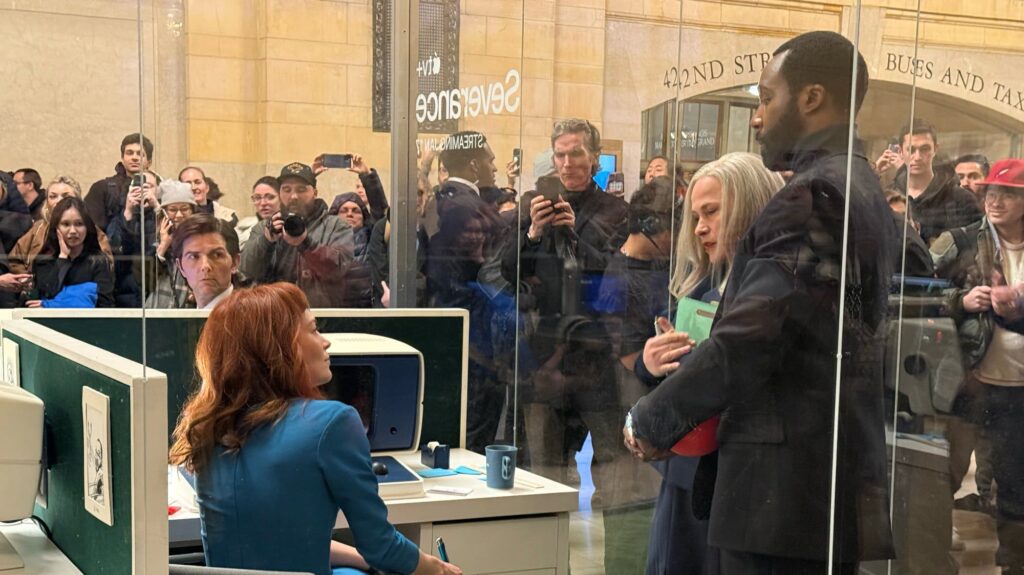Diving In: Katy Perry vs. Wendy’s
What happens when pop stardom, space travel, and corporate cheerleading collide in 2025?
Katy Perry’s recent Blue Origin space flight has triggered one of the year’s clearest case studies in backlash culture and brand volatility.
Meant to be an inspirational moment—spotlighting female astronauts and “empowering content”—Perry’s journey quickly veered off course as fans and followers questioned the timing, tone, and context. The controversy was amplified by a viral Wendy’s tweet and fueled by mounting critiques of celebrity-brand alignment in a climate-conscious, crisis-aware digital world.
Want to dig in even deeper? Check out the ListenFirst Quick Service & Fast Casual Restaurants brand set to see more about Wendy’s and the competitors vying for social greatness.

Backstory
Blue Origin x Katy Perry
Founded by Jeff Bezos in 2000, Blue Origin is a private aerospace company focused on commercial space tourism. While often positioned as a symbol of technological progress, the brand has come under fire for its environmental impact, billionaire-centric model, and the perceived frivolity of space travel in the face of urgent crises on Earth.
Katy Perry, known for her chart-topping pop hits and flamboyant persona, has long positioned herself as a cultural chameleon, pivoting from playful bubblegum pop to polished pop activism. In 2025, she joined Blue Origin’s first all-female crew, a mission framed as both historic and empowering. Her participation was intended to highlight inclusion and possibility, but it also spotlighted the growing gap between celebrity spectacle and public perception.
This moment also resurfaced Perry’s long history of public controversy. Over the years, she’s faced accusations of tone-deaf performances, culturally insensitive visuals, and even inappropriate on-set behavior, including allegations of sexual harassment that resurfaced in a 2019 report from Vice & Paper Magazine. While Perry has not really responded directly to these claims, they’ve contributed to an ongoing perception that her brand of empowerment can, at times, ring hollow. Critics have noted a recurring pattern: messaging that aims to be empowering but is often perceived as lacking nuance or empathy in execution.
It also came at a moment when Perry was already facing scrutiny. Her latest album, 143, has underperformed both critically and commercially. Lead single “Woman’s World,” a track intended to be a feminist anthem, stalled at No. 63 on the Billboard Hot 100. Fans and critics questioned not only the track’s message but also her decision to work again with controversial producer Dr. Luke. Though Perry framed the song as empowering, many saw the collaboration as a misstep—undermining its intended message.
Coupled with lackluster follow-up singles and an album rollout described as “uncommonly messy,” the space flight—and its accompanying brand spectacle—landed within a cultural climate already skeptical of Perry’s current positioning. Rather than functioning as a triumphant cultural moment, the Blue Origin launch became entangled in a broader narrative: a pop star navigating a shaky comeback in an era that demands more authenticity and accountability.
Would the same scrutiny have been placed on Chappell Roan or Britney Spears? There’s no way to know, but it raises important questions about who gets cultural grace during a misstep. Perry’s high profile, history of calculated pop comebacks, and perceived dissonance between message and execution made her a particularly easy target in a social media ecosystem that thrives on contradiction.
Wendy’s
Founded in 1969 in Columbus, Ohio, by Dave Thomas, Wendy’s has long positioned itself as the witty, rebellious alternative in the fast-food space. Known for its square burgers, signature Frostys, and “fresh, never frozen” messaging, the chain became a cultural mainstay in part due to its irreverent advertising. In the digital era, that voice has carried over to social media, where Wendy’s has carved out a distinct identity built on snarky comebacks and meme-friendly humor. Its social strategy—once praised as groundbreaking—has occasionally crossed the line, raising questions about tone, timing, and the fine balance between boldness and backlash.
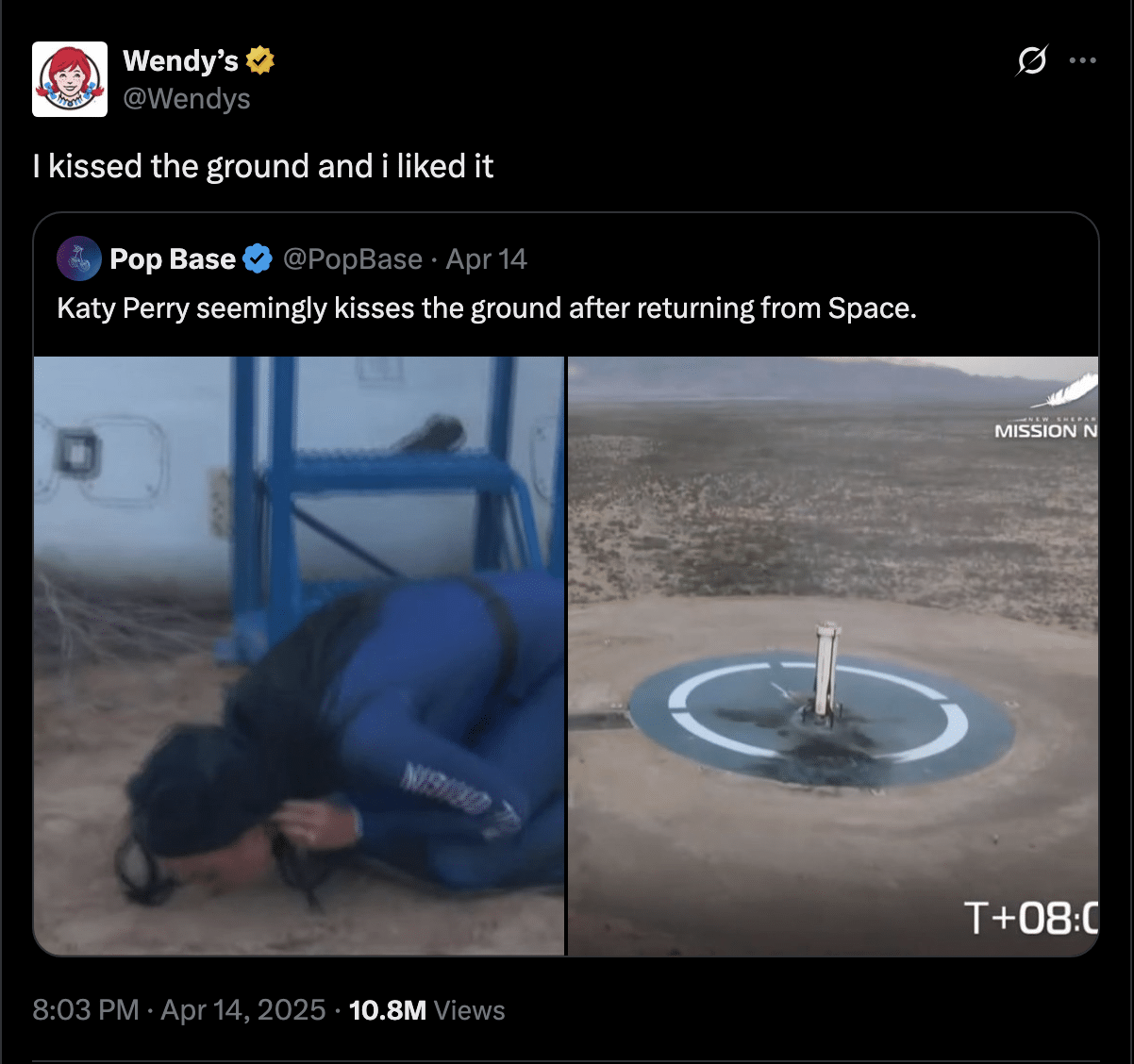
What’s Happening?
On April 14, 2025, Katy Perry posted a video from her Blue Origin flight, captioned:
“Still processing this incredible journey… making room in space for all – 143”
The video drew 1.7M likes on Instagram but also tens of thousands of critical comments, including:
- “Nothing like the elite sending the elite to space.”
- “You guys could’ve fed millions of people with all that money!”
- “Us: sipping oat milk through soggy paper straws / Them: launching Katy Perry into space.”
Just hours later, Wendy’s posted on X:

“I kissed the ground and I liked it” (a play on Perry’s own lyrics), racking up 166,216 engagements.
Many users called the tweet “tone-deaf,” “brand cringe,” and “trying too hard to stay relevant.”
The brand didn’t stop there. On April 14 alone, Wendy’s posted a series of snarky follow-ups:
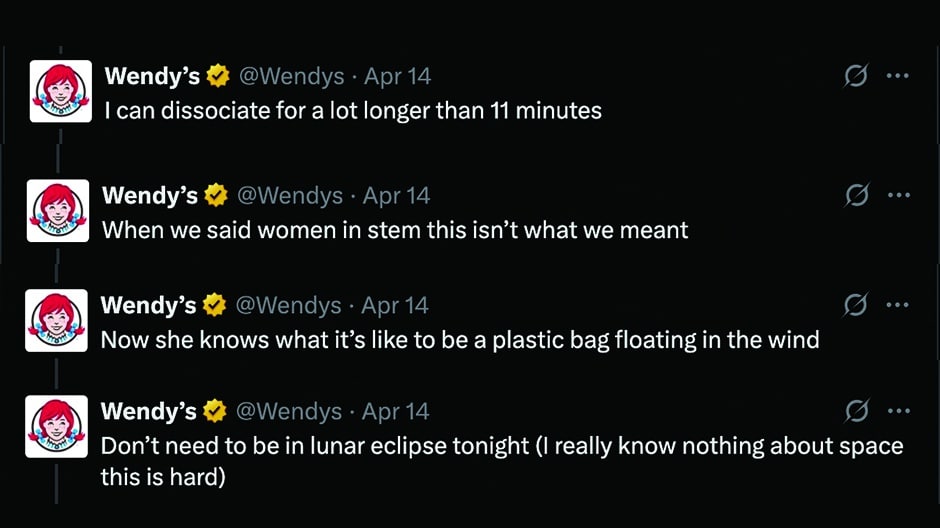
While some posts drew praise from fans of Wendy’s trademark sass, others sparked frustration over the brand’s overuse of levity around a moment increasingly seen as culturally tone-deaf.
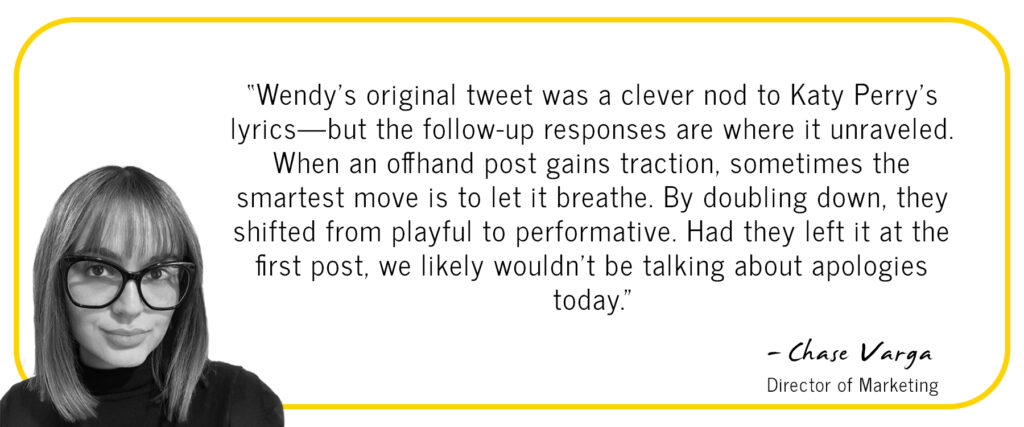
According to ListenFirst data:
Perry lost 504,000 followers across platforms in 3 weeks after the announcement, with the most significant single-day drop occurring on April 15th, 2025—the day after the Blue Origin slight and Wendy’s tweet thread, with a combined net loss of -51,309 followers.
Engagements rose +127%, but much of it was negative sentiment or parody
Public impressions surged +236%, and video views jumped +215%
Wendy’s saw a different kind of attention:
Lost 23.6K followers in the same period (-64% compared to previous)
Engagements rose +58%, totaling 360K, and public video views hit 4.28M (+472%) — largely attributed to the viral tweet thread
Public impressions surged +501% to 24.5M, though it’s unclear whether the follower loss is directly tied to the tweets or part of a broader trend
The backlash escalated further when an anonymous source, quoted in People, criticized Wendy’s for using its platform to “publicly demean a woman” and called for an apology to Perry. “Wendy’s didn’t make a joke—they made a choice,” the source said, adding that it was “painfully ironic” coming from a brand whose mascot is a woman.
In a public statement to People, Wendy’s responded: “We always bring a little spice to our socials, but Wendy’s has a ton of respect for Katy Perry and her out-of-this-world talent.”
The Blue Origin flight, which featured the first all-female crew, included journalist Gayle King, pilot & partner of Jeff Bezos Lauren Sánchez, former NASA scientist Aisha Bowe, bioastronautics expert Amanda Nguyen, and producer Kerianne Flynn. Still, the trip drew criticism for its environmental impact and cost.
Media outlets like Yahoo and E! News piled on with headlines questioning Perry’s public image, while old controversies resurfaced, including accusations from Trace Cyrus over copying Miley Cyrus’s aesthetic.

Brand/Marketer Implications
This isn’t about space—it’s about perception vs. intention, and what happens when a brand (or celebrity) misreads the room:
Risk #1: The “Empowerment” Playbook is Worn Thin
Perry’s caption framed the space flight as inclusive and inspirational, but audiences, especially Gen Z, are increasingly skeptical of billionaire-led stunts that are presented as altruistic or empowering. In this case, the backlash wasn’t just about the spaceflight; it was about the dissonance between the elite nature of the act and the message of universal empowerment. For brands, this moment echoes past critiques—like the backlash to “pink” consumerism or Nike’s celebration of female athletes while failing to support them behind the scenes. When empowerment is used as a brand wrapper for privilege, the gap between message and reality becomes the story.
Risk #2: Reactionary Posting by Brands = Dangerous
Wendy’s tweet thread was on-brand for their social tone, but poorly timed for the cultural mood. Their post generated a major spike in impressions and video views, but also led to significant follower loss and criticism that undercut their intended humor.
Risk #3: Engagement ≠ Endorsement
Yes, impressions and video views spiked for both Perry and Wendy’s—but net sentiment declined, followers dropped, and Perry’s relatability rating (qualitatively measured through TikTok and comment sentiment) took a hit.
Platform & Cultural POV
This controversy taps into platform-specific backlash mechanics:
TikTok: Dozens of viral stitches and duets mocked the launch with soundbites like “Eat the rich” and memes on “late-stage capitalism.”
Reddit: Threads across the platform, posted on subreddits such as r/AskFeminists, dismissed the flight as a “stunt” with a top comment simply saying, “It wasn’t a ‘feminist’ space flight. It was a celebrity publicity stunt. Women =\= feminist.” Other comments resurface old articles where Katy Perry referred to herself as an “environmentalist” with added eye-roll emojis.
Instagram: High-profile comments and verified creators (e.g., @melaniiemurphy’s viral oat milk joke) amplified the irony of eco-conscious fans watching a pop star launch into space.
X: Fast-moving memes and sarcastic replies outpaced traditional media coverage. The Wendy’s thread itself became a meme template, with replies mocking both the brand and Perry’s messaging.
We’re seeing a breakdown in the “relatable celeb” model. The same platforms that built Perry’s cultural capital are now surfacing the tension between fame and relevance.
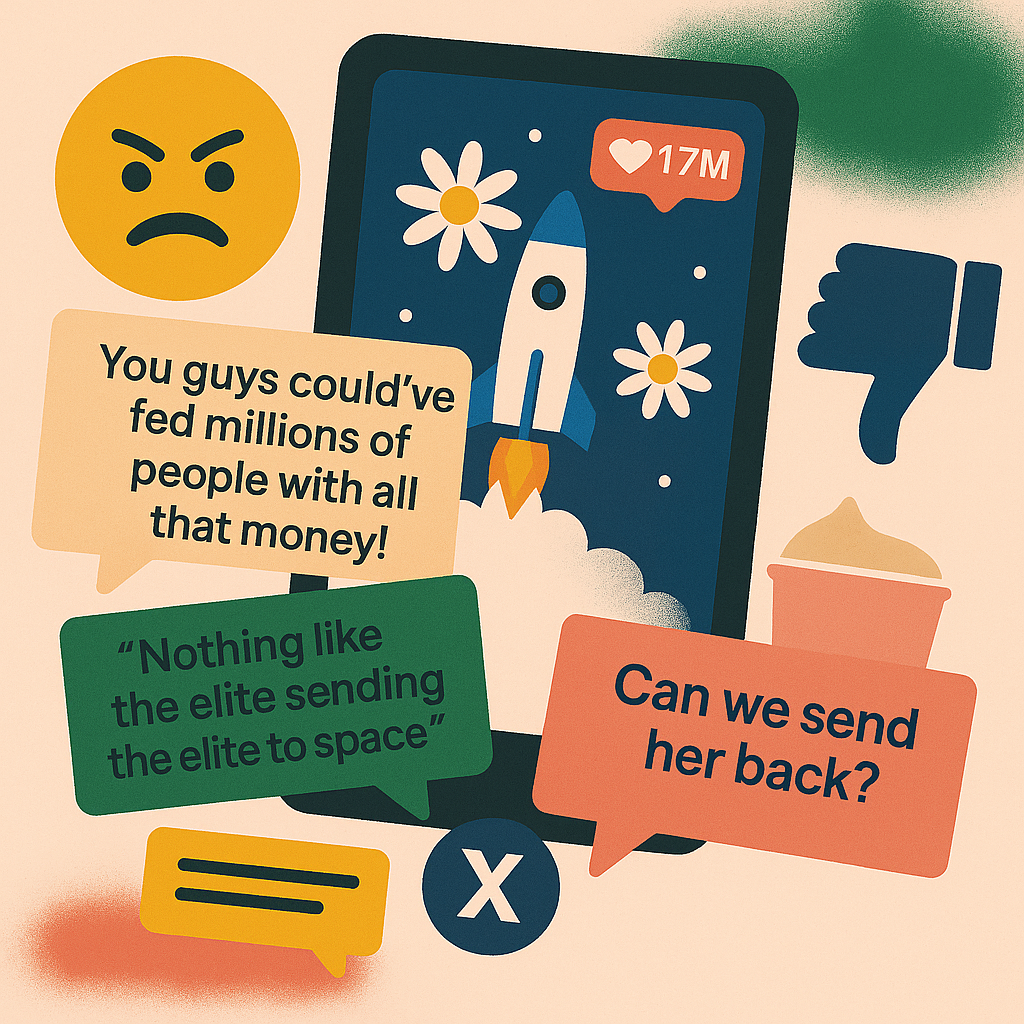
Key Takeaways for Marketers
🔍 Reputation > Reach: Katy Perry’s post reached millions, but follower loss shows attention isn’t always positive.
🛌 Pause Before Posting: Brands should think beyond real-time engagement and ask: Does this moment match our values?
🎯 Tone > Timing: Wendy’s tweets hit the wrong note at the wrong time. Be funny, but not flippant—especially around loaded topics.
📉 Monitor Fan Sentiment, Not Just Metrics: KPIs can mislead. Qualitative analysis of comments and creator response is just as critical.
🚀 “Empowerment” Isn’t a Free Pass: Space travel, climate optics, wealth signaling—it’s all up for scrutiny. Brands need to contextualize or risk blowback.
Final Thought
In 2025, virality without values is a risk. As the backlash cycle speeds up, the question for marketers isn’t just “how loud can we be?” but “do we know what we’re echoing into?”
Wendy’s Public Social Stats as of April 20th, 2025
| Metric | Value |
| Follower Growth | 23.6K |
| Total Followers | 15.4M |
| New Posts | 70 |
| Engagements | 360K |
| Response Rate | 0.15% |
| Public Impressions | 24.5M |
| Public Video Views | 4.28M |
Wendy’s data is sourced from the ListenFirst Quick Service & Fast Casual Restaurants brand set.
Want more deep dives like this? Make sure to subscribe to our weekly newsletter, LF Pool Party, for everything social media professionals need to know to make their strategy a 10/10.






